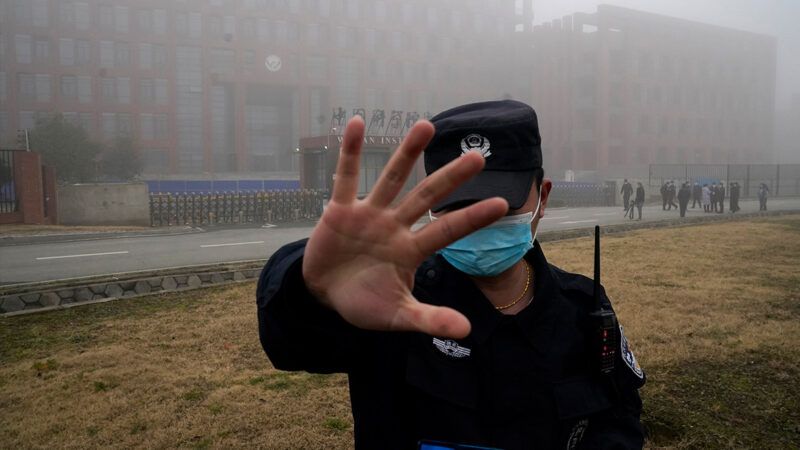Will Trump and the New GOP Congress Get to the Bottom of COVID-19's Origin?
It's a good sign that the president is calling on critics of the federal government's lack of transparency to staff his administration.

Will the incoming Trump administration and Republican Congress get to the bottom of how the COVID-19 pandemic began? There's every indication that they'll at least try.
The idea that the pandemic originated in the Wuhan Institute of Virology (WIV) in China—and that U.S. government–funded research contributed to the virus's creation—has gone from a derided conspiracy theory to a credible hypothesis with some mainstream acceptance in the past few years.
Thanks to information obtained through congressional probes and investigative journalism, we already know that U.S. government–funded researchers were engaged in gain-of-function research on coronaviruses at the WIV.
We know the same researchers proposed using federal grants to create viruses with many of the unique features of the virus that caused the pandemic; they even cited the cost-effectiveness of doing so under the Chinese lab's lower biosecurity protocols.
We also know that researchers and their funders at the National Institutes of Health (NIH) tried to evade scrutiny of this work through various dirty tricks aimed at avoiding public records requests and indulging in word games about the definition of "gain-of-function" research.
Two U.S. federal agencies, the Department of Energy and the FBI, rank a lab accident as the most likely explanation of the origin point for the pandemic. The Republican-led House Select Subcommittee on the Coronavirus Pandemic concluded the same in its final report released in December 2024.
Nevertheless, none of these assessments are definitive. There's still a lot we don't know.
"There would be grant proposals which have not yet been released, progress reports which have not yet been released, correspondence with the funding agencies on reporting and compliance that has not been released," says Richard H. Ebright, a molecular biologist at Rutgers University and an archproponent of the lab leak hypothesis.
All this information, he says, is within the federal government and has been withheld from the public. Much of it has even been withheld from congressional committees attempting to perform oversight, says Ebright.
Under the Biden administration, federal agencies have been pretty reticent to release information that could shed more light on U.S.-funded work at the WIV and the potential origin of the pandemic there.
Considering some of President Donald Trump's nominees to helm federal agencies in charge of research funding and intelligence gathering, it seems likely his administration will prove more transparent on this question.
For starters, the president announced the nomination of Stanford professor and medical researcher Jay Bhattacharya to head the NIH. Bhattacharya has expressed openness to the lab leak hypothesis in the pages of Reason while also criticizing officials' lack of transparency on this topic.
Bhattacharya also served on the board of directors of the group Biosafety Now, which is opposed to gain-of-function research on pandemic pathogens and has also supported the lab leak hypothesis.
A law Congress passed unanimously in 2023 required the director of national intelligence to declassify material related to COVID-19's origins. That law produced only a 10-page partially redacted summary of the intelligence community's findings that included little new information. But Trump has nominated former Rep. Tulsi Gabbard (D–Hawaii) as the next director of national intelligence, and she has said she leans toward the lab leak hypothesis. If confirmed, Gabbard would be in a position to release more classified documentation on COVID-19's origins.
On the legislative side, Sen. Rand Paul (R–Ky.) will take over chairmanship of the Senate Homeland Security and Governmental Affairs Committee. As minority ranking member of the committee, Paul has already hosted a number of hearings on the pandemic's potential origins in a Chinese lab.
Back in July, Paul introduced the Risky Research Review Act. The bill would create a new board—whose members would be appointed by the president and confirmed by the Senate—to perform a risk-benefit analysis of so-called high-risk life science research that could increase the virulence of pathogens.
This oversight board would be empowered to demand documentation (including classified documents) from federal funding agencies about risky pandemic research. Crucially, it would have the power to request documents on past research that's already been funded.
Paul's bill passed out of committee but stalled in the Democrat-controlled Senate. With Republicans in control of both chambers of Congress, the bill stands a better chance of becoming law.
Paul is optimistic that a new Republican congressional majority invested in the question of COVID-19's origins and a Republican administration more willing to share information with Congress will yield more answers.
"I think we're on the cusp of, really, the beginning of uncovering what happened with COVID," Paul told the New York Post in November.
This article originally appeared in print under the headline "Will We Get to the Bottom of COVID-19's Origin?."
Rent Free is a weekly newsletter from Christian Britschgi on urbanism and the fight for less regulation, more housing, more property rights, and more freedom in America's cities.


Show Comments (99)